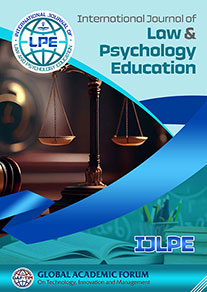Journal Policy
Peer Review Process Policy
The International Journal on Law and Psychology Education (IJLPE) upholds the highest standards of academic integrity and rigor in the research it publishes. We ensure the quality, relevance, and validity of our articles through a rigorous, transparent, and equitable peer review process that adheres to the best practices of scholarly publication ethics. The following outlines the stages and expectations of the peer review process at IJLPE.
- Confirming Authorship Statement: IJLPE requires all authors to confirm their authorship contribution to the submitted manuscript. Each author must provide a clear statement acknowledging their individual contributions to ensure transparency and integrity in the authorship process and help avoid disputes over authorship credits. Any changes to the authorship list must be approved by all authors and justified in writing to the editor.
- Initial Screening: Manuscripts undergo initial screening by the editorial team to ensure they align with IJLPE's scope in law, psychology, and education, adhere to formatting guidelines, and meet ethical requirements. Manuscripts not meeting these criteria may be rejected without proceeding to peer review.
- Plagiarism Policy Statement: IJLPE maintains strict standards of academic integrity and ethical conduct and strictly prohibits plagiarism. All manuscripts are subject to a thorough plagiarism check using sophisticated software. Manuscripts with significant plagiarized content are immediately rejected.
- AI-Based Plagiarism Policy: IJLPE implements AI-based plagiarism detection to identify potential plagiarism, including content generated by AI-based software. Manuscripts with AI-based plagiarized content will face strict measures, including possible rejection or retraction.
- Selection of Reviewers: The editorial team selects at least two independent, qualified experts in the fields of law, psychology, and education to review each manuscript. Reviewers are chosen based on their expertise, reputation, and experience in peer review. The journal employs a double-blind review process.
- Reviewer Guidelines and Evaluation Criteria: Reviewers are provided with guidelines and criteria to assess manuscripts, including originality, methodological rigor, clarity of presentation, ethical considerations, and validity of conclusions. Constructive feedback is encouraged.
- Review Timeline: Reviewers are given a specified timeframe, typically 2-4 weeks, to complete their assessments. Delays should be communicated promptly to the editorial team.
- Review Reports and Editorial Decision: The editorial team evaluates the reviewers' feedback to make informed editorial decisions, such as acceptance, minor/major revisions, or rejection. Decisions and anonymized reviewer reports are communicated to authors.
- Revision and Re-Review: Authors address all reviewer comments in revisions. The revised manuscript may be re-assessed by original or new reviewers.
- Final Decision and Acceptance: The editorial team makes the final decision after revisions. Accepted manuscripts proceed to production for copyediting and formatting.
- Copyright Statement: Upon acceptance, authors grant IJLPE exclusive, worldwide, royalty-free copyright. Authors retain rights for personal, educational, or non-commercial use with appropriate credit.
- Appeals and Complaints: Authors may appeal editorial decisions by providing detailed reasons. The editorial team may consult additional experts before making a final decision.
- Confidentiality: Strict confidentiality is maintained throughout the peer review process.
- Reviewer Recognition and Ethical Conduct: IJLPE values and recognizes reviewer contributions. Reviewers must adhere to ethical guidelines, including confidentiality and impartiality.
- Post-Publication Corrections & Retraction Statement: IJLPE is committed to preserving the integrity of the scientific record. Serious concerns about published articles are investigated, and retractions are issued when warranted.
- Transparency and Openness: IJLPE supports transparency in peer review and scientific research. Authors and reviewers are encouraged to communicate openly. The journal promotes data sharing and accessibility for reproducibility and transparency in research.
Authorship and Contributorship Policy
The International Journal on Law and Psychology Education (IJLPE) adheres to the best practices for authorship and contributorship as recommended by the Committee on Publication Ethics (COPE).
Criteria for Authorship: To qualify for authorship in IJLPE, an individual must meet all the following criteria: (a) Substantial contributions to the conception, design of the work, or the acquisition, analysis, or interpretation of data for the work. (b) Drafting the work or revising it critically for important intellectual content. (c) Final approval of the version to be published. (d) Agreement to be accountable for all aspects of the work, ensuring that questions related to the accuracy or integrity of any part of the work are appropriately investigated and resolved.
- Contributorship: Individuals who have contributed to the work but do not meet the full criteria for authorship should be acknowledged in the Acknowledgments section of the manuscript. This may include those who have provided technical assistance, data collection, statistical analysis, or general support.
- Authorship Order: The order of authors listed in the manuscript should accurately reflect each individual's relative contributions to the work. All authors must agree on the final authorship order before submitting the manuscript for publication.
- Corresponding Author: One author should be designated as the corresponding author, responsible for ensuring that all authors have approved the manuscript, its submission to the journal, and managing all communication between the journal and the other authors. The corresponding author is also responsible for ensuring that all authors meet the criteria for authorship and contributorship.
- Changes in Authorship: Any changes in authorship, including the addition or removal of authors or changes in authorship order, must be agreed upon by all authors and communicated to the journal in writing before publication. The journal reserves the right to seek confirmation from each author's affiliated institution in cases where concerns about authorship arise.
IJLPE Privacy Statement
The International Journal on Law and Psychology Education (IJLPE) is committed to maintaining the privacy and confidentiality of its readers, authors, and reviewers. We adhere to strict privacy standards to protect the personal information of our users, in line with the Committee on Public Ethics (COPE) code of conduct.
As part of our commitment to data privacy, we assure our readers that their names and email addresses will only be used for purposes directly related to the journal's operations, including communication regarding article submissions, peer-review processes, editorial decisions, and notifications about new content and journal updates.
We will never sell, rent, or share your personal information with third parties for marketing, advertising, or any other unrelated purposes. Additionally, we have implemented appropriate security measures to safeguard your personal information from unauthorized access, disclosure, alteration, or destruction.
By using the IJLPE website and its services, you consent to the collection, use, and storage of your personal information as described in this Privacy Statement. We reserve the right to update this Privacy Statement at any time and encourage you to review it periodically to stay informed about how we protect your privacy.
If you have any questions or concerns about our Privacy Statement or the handling of your personal information, please contact us at info@gaftim.com.
IJLPE “Creative Commons” Statement
All articles published in the International Journal on Law and Psychology Education (IJLPE) are licensed under the Creative Commons Attribution 4.0 International License (CC BY 4.0). This license allows unrestricted use, distribution, and reproduction in any medium, provided the original author and source are credited appropriately.
Under the terms of the CC BY 4.0 license, users are free to:
- Share — copy and redistribute the material in any medium or format.
- Adapt — remix, transform, and build upon the material for any purpose, even commercially.
Under the following terms:
- Attribution — You must give appropriate credit, provide a link to the license, and indicate if changes were made. You may do so in any reasonable manner, but not in any way that suggests the licensor endorses you or your use.
- No additional restrictions — You may not apply legal terms or technological measures that legally restrict others from doing anything the license permits.
To view a copy of the CC BY 4.0 license, visit https://creativecommons.org/licenses/by/4.0/










